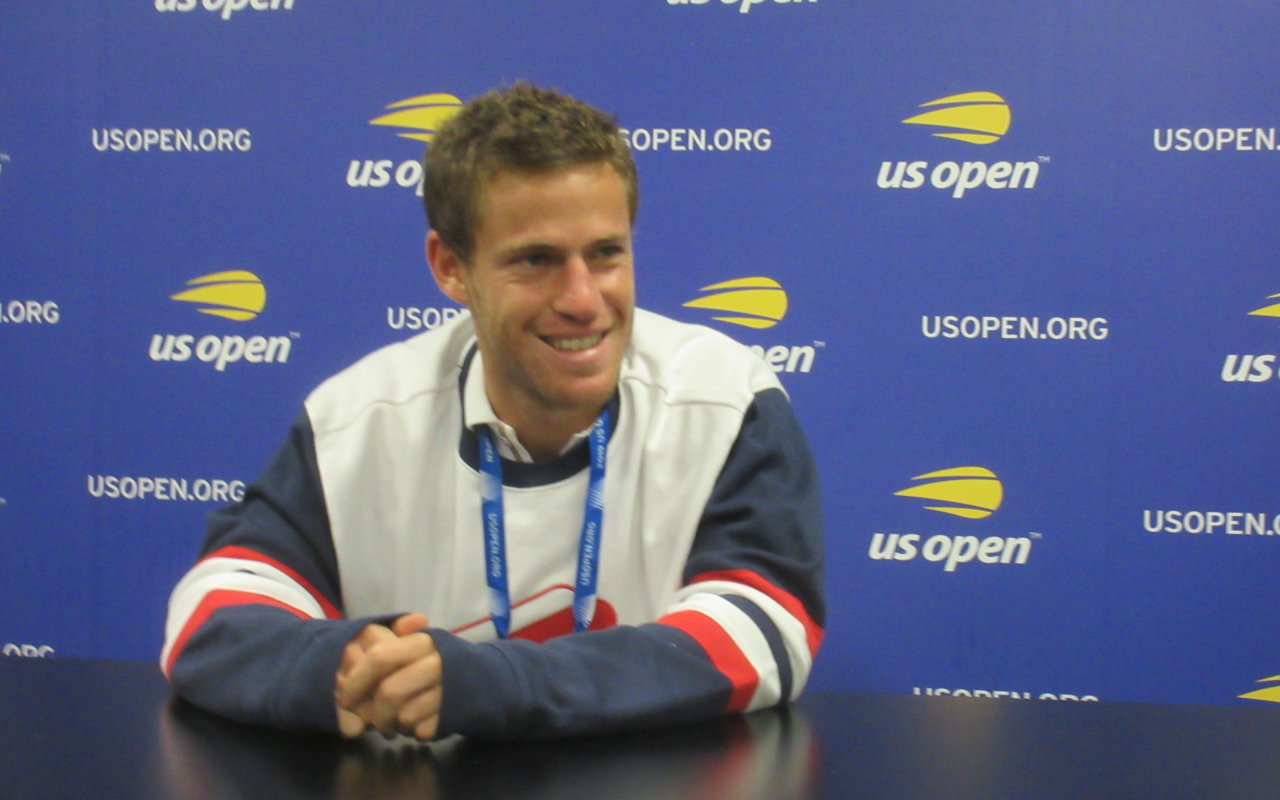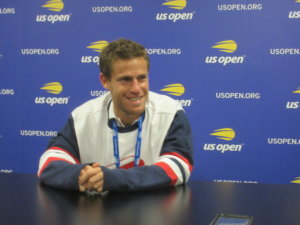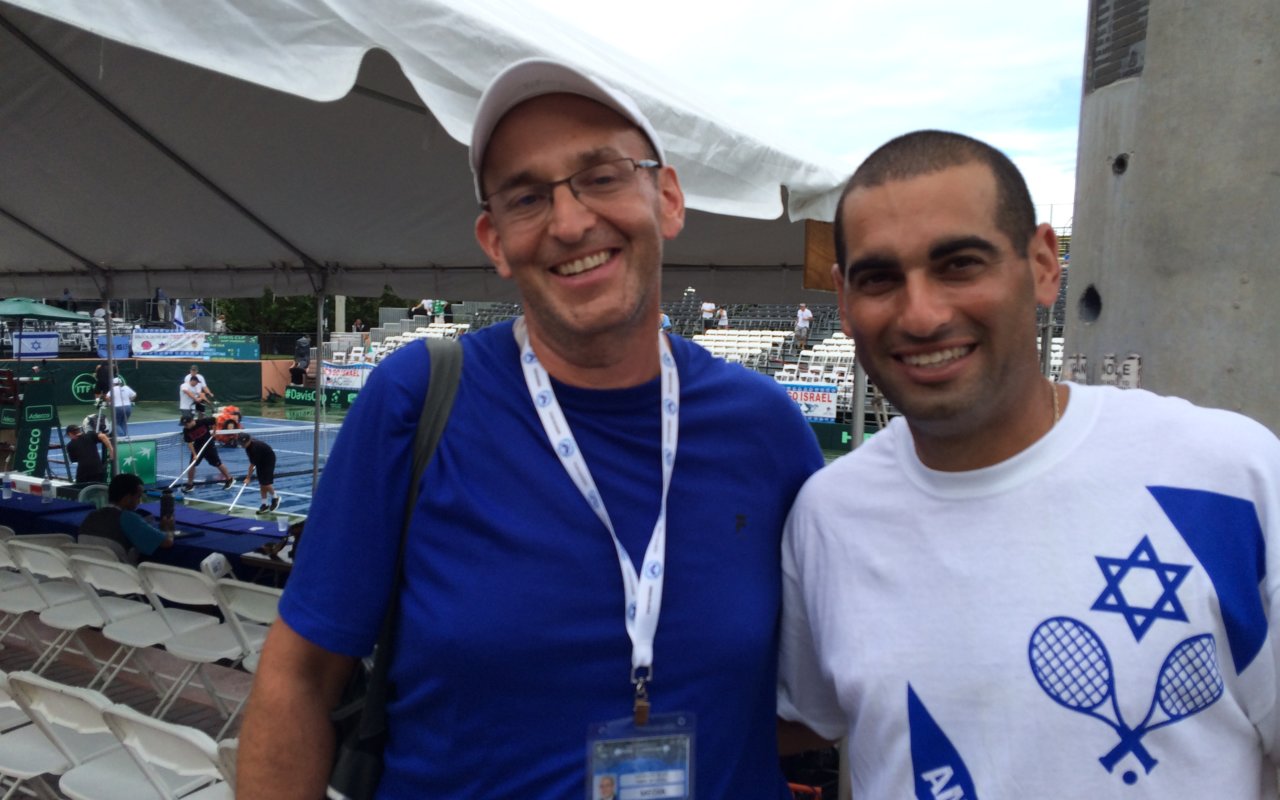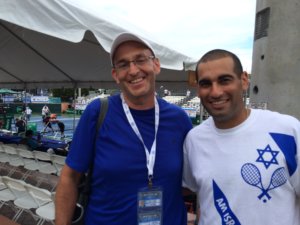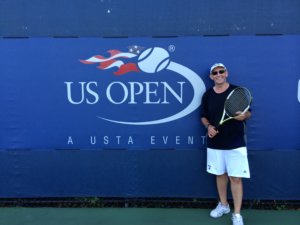I have tennis on my mind 24/7 these days! Yesterday, I was delighted to have two tennis articles published in the Jerusalem Post—one featuring Israeli tennis legend, Andy Ram, and the other featuring American Jewish tennis player, Noah Rubin, who is making a name for himself on the court and off, with his Behind the Racquet series, where he has helped more than 50 professional tennis players share their stories of challenges, mental health issues, etc. (I couldn't resist sharing my photo with Andy Ram from the Davis Cup in Florida a few years back–and the photo from a US Open media tournament!)
I have been thinking about tennis since the very exciting, albeit with no fans or media US Open, which just came to a close. I was lucky enough to have a good number of articles published in the Jerusalem Post; while Noah Rubin made it “in,” my final US Open wrap up piece didn’t make it—this happens sometimes given the time frame between writing and publishing—especially with Israel 7 hours ahead of the US! The never published piece—which references the extremely exciting Zverev/Thiem match, Osaka/Azarekna, Wheelchair Tennis, and the upcoming French Open—scheduled to take place with fans—is in italics below.
Tennis is also on my mind since I have been lucky enough to play 3 or 4 times a week these past few weeks. It seems that tennis’ popularity really IS on the rise. In a pre-US Open blog, I noted that racket and balls sales are up in recent months—tennis IS the social socially distant sport—unlike basketball or football or so many other sports, it is possible to socialize while maintaining a safe distance while playing tennis.
It has been especially fun to play on public courts with so many different partners, from so many different backgrounds. It is fun going to the local pubic courts and watching parents introducing children to the game on one court, while pros give lessons on other courts, and old friends play on yet other courts. Let’s hope the weather holds out for outdoor tennis—just a few more weeks! Perhaps by then, indoor courts will open somewhere, and the grass growing through the public park cracks will die—just in time for next season!
US OPEN WRAP UP—by Howard Blas
Another US Open, albeit an unusual one, is in the books. No. 5 Alexander Zverev and No. 2 Dominic Thiem walked out on the court at Arthur Ashe Stadium at 4:17 pm New York time to battle it for the winner’s trophy and top prize of $3 million ($1,500,000 for the runner up). Zverev raced off to a two set lead and appeared to be on track to quickly defeat Thiem, despite Thiem leading the head-to-heads, 7-2, including a 3-0 edge in the majors. At the 2020 Australian Open, Thiem met Zverev in the semis and said, “I know what Sascha is capable of. The last match we had in Australia, we were both, I mean, really, really good. It was such a close match.”
Three hours later, Thiem learned what Thiem is capable of! Thiem battled back to win the greatest comeback in US finals history, winning 26, 46, 64, 63, 76 (8-6) in four hours, two minutes and becoming the first US Open finalists to come back to win from two sets down. Thiem experienced right leg cramps in the tie breaker, but managed his fastest served of the match at 132 MPH, while encountering two Zverev double faults and a weak 68 MPH second serve.
In the post-match interview, Zverev said, “It was a tough battled. I wished you would have missed a little more and I would be holding the trophy.” He then began crying in describing his parents’ absence from the tournament due to a positive Covid test.
Thiem responded, “I wish we could have had two winners today. We both deserved it.”
Prior to today’s match, the most significant feature of this year’s US Open finals was that it didn’t feature anyone named Nadal, Federer or Djokovic. At the start of the tournament, 17-time Grand Slam champion, Novak Djokovic, appeared on track to be the easy tournament winner. The tennis world was stunned when he was defaulted in the fourth round last Sunday after hitting a ball in frustration that struck a line judge in the throat on the court at Arthur Ashe Stadium. This was truly a US Open for the record books.
On Saturday, No. 4 seed, Naomi Osaka trailing by a set and a break, battled back for an incredible 1-6, 6-3, 6-3 victory over former world No. 1 Victoria Azarenka to win the women's singles title. Osaka, 22, captured the 2018 US Open under very different circumstances. Serena Williams, who lost in this year’s semifinals, was penalized a game for calling the chair umpire a “thief” during a protracted argument, with play delayed and fans booing. Osaka ultimately won, 6-2, 6-4 for her first Grand Slam title.
At the conclusion of yesterdays’ match, Osaka recounts, “I feel like two years ago, I maybe would have folded being down a set and a break, but I think, all the matches that I played in between that time shaped me and made me or forced me to mature more. Especially all the matches that I've played here were very tough. I think definitely I'm more of a complete player now. I feel like I'm more aware of what I'm doing.”
Azarenka, the 31-year-old Belarussian, who reached her last Grand Slam final seven years ago, and spent several years in a complex custody battle over 4-year-old son, Leo, was proud of her performance while also paying proper tribute to Osaka. “I did everything I could today. Could I have played better? I think I could. But I left everything I could on the court today. She won the match. All the credit to Naomi. She's a champion.”
Osaka is the first woman to rally from a set down to win the singles championship match since Arantxa Sanchez Vicario in 1994. She is also the first Asian player to win three Grand Slam singles titles, breaking the tie she held with China’s Li Na. Osaka’s father, Leonard Francois, is Haitian-born, and mother, Tamaki Osaka, is Japanese.
Osaka has made headlines these past few weeks for taking a stand on social justice issues.
Naomi Osaka wore masks featuring names of Black victims of police brutality and racial injustice throughout the entirety of her U.S. Open run. Her masks honored the memories of Breonna Taylor, Elijah McClain, Ahmaud Arbery, Trayvon Martin, George Floyd, Philando Castile and Tamir Rice.
In the Western & Southern Open tournament leading up to the US Open, also played on the grounds of the US Open, Osaka followed the lead of the NBA’s Milwaukee Bucks basketball team, who walked off the court before a playoff game against the Orlando Magic, setting off a two-day sports blackout. Osaka’s boycott and wiliness to forfeit lead to the tournament taking a brief break before resuming.
At a press conference following her US Open final victory, a reporter noted that Osaka has been receiving thank you messages from some of the families of those killed and asked if she would be willing to meet with families and talk with them once the tennis season is over. Osaka replied, “Yeah, I mean, definitely. I feel like for me I learn more through experiences. Everyone sort of thinks they know, or I actually don't want to know how they're feeling or how they felt during the process. For me, I feel like sharing stories and hearing people's experiences is very valuable.”
With Osaka’s US Open victory, she returns to the Top 3 in the world rankings.
This year’s US Open featured men’s and women’s doubles and wheelchair tournaments, but not mixed doubles or juniors. The USTA originally planned to not feature wheelchair tennis this year in an effort to keep the number of people onsite to a minimum; ultimately, they relented and hosted men’s and women’s wheelchair singles and doubles and quads singles and doubles.
Shingo Kunieda, the No. 1 seed form Japan, won the U.S. Open men's wheelchair singles title, defeating Alfie Hewett 6-3, 3-6, 7-6 (3) in a 2 hour 54-minute marathon.
In a press conference with USTA CEO Mike Dowse and US Open tournament director Stacey Allaster, held just three hours before the historic men’s finals, the two reflected on the tournament, lessons learned and the upcoming French Open. They were proud of their decision to carefully and thoughtfully proceed with the tournament. Dowse reports, “We really established some guiding principles at the beginning. The first one was could we do it in a healthy and safe way for everyone. That included the players, the staff, even the local community here in New York. The second guiding principle was is this good for the sport of tennis, will it reignite our industry in the broader tennis ecosystem. The third question is frankly did it make financial sense, that included for the players and for the USTA, again the broader tennis ecosystem.”
With the tournament winding down, they addressed finer points of the tournament, including automated line calls on the outside courts. Allaster reports, “We've had four weeks of the experiment of Hawk-Eye Live. It's been a terrific success. There's no debate.” She shared interesting data points. “Over the four weeks, Hawk-Eye Live has made a total of 304,000 calls. Close calls, 11,901. Those are the red or green that the chair umpire is seeing. The close calls during the US Open, just over 9,000. This was a 2020 focus. We made no decisions around 2021. But this was a great effort on behalf of all of our competition team and the Hawk-Eye team members, both tours, to support the experiment. We couldn't be more pleased with how it has been executed.”
When asked about key takeaways from the US Open, Dowse spoke of the importance of ongoing collaboration with so many people and agencies in the decision making process. Allaster adds, “I think these four weeks have been able to demonstrate to the world how our sport can return to play safely.” Dowse notes, “We had weekly calls with our peers at the Grand Slam board, so we've shared best practices with them, specifically Roland Garros who is starting in a few weeks.”
This has been a most unusual year for professional tennis. Wimbledon, which usually takes place in July, was cancelled. The rescheduled French Open, usually held in late May, will take place in two weeks, from September 20-October 4th. Unlike the US Open, held with no spectators and few members of the press in attendance, the French Open will permit spectators. “I trust that the French Federation, with their leadership, and the French government, that they're managing the virus with their medical facts. They've deemed in their country, in their city, that it's safe,” notes Allaster.


